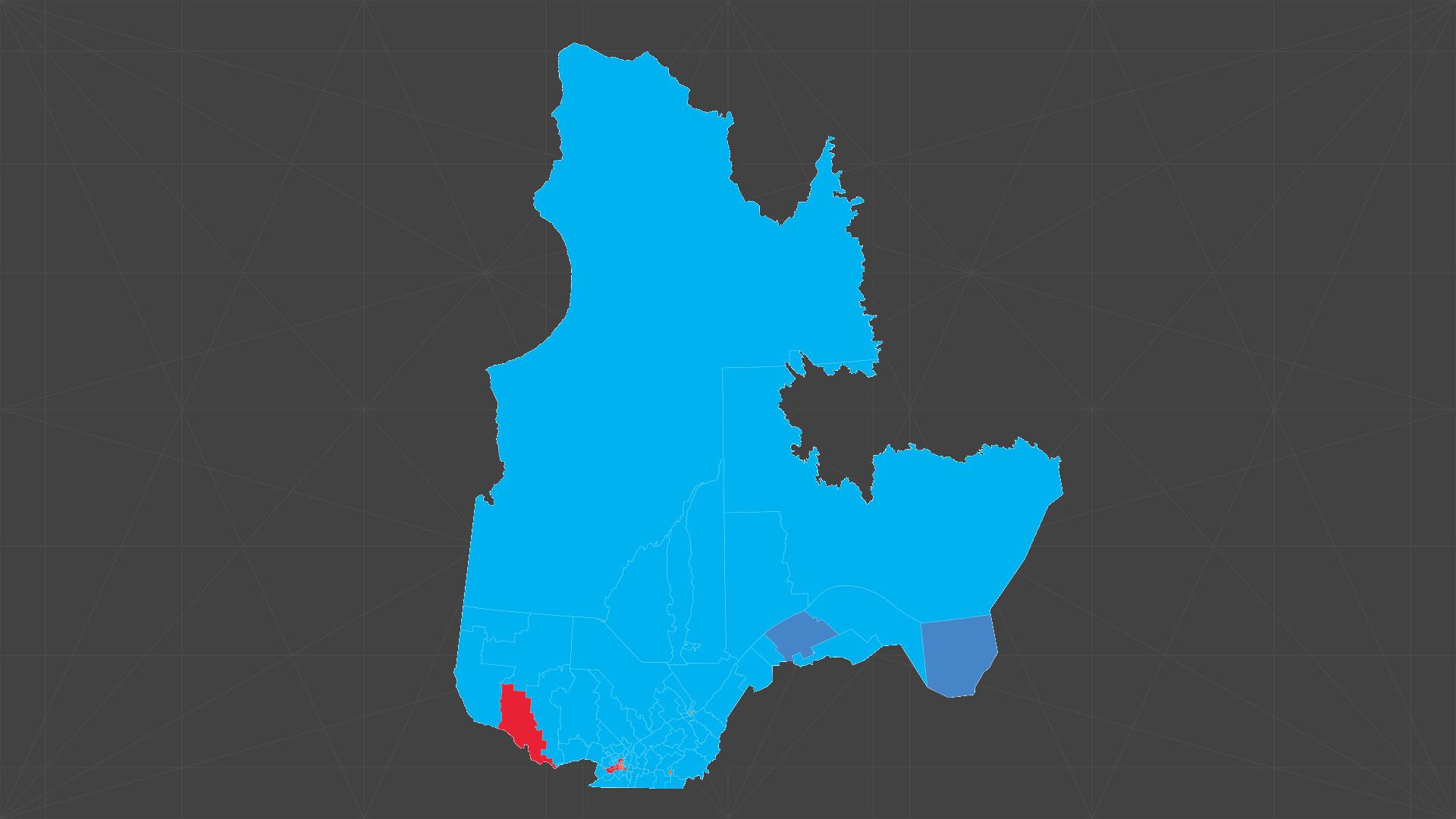From
A CAQ wave has spread almost everywhere in Quebec, leaving little room for the opposition parties. In ten years, François Legault’s party will succeed in significantly changing the electoral picture of the province. Overview region by region.
The Coalition Avenir Québec (CAQ) won 72% of the 125 elections and was able to send 90 MPs to the National Assembly. The Quebec Liberal Party (PLQ) came in second with 21 seats, followed by Québec Solidaire (QS) with 11 seats. By winning only three seats, the Parti Québécois (PQ) almost disappeared from the political arena. With a new leader at the helm, the Conservative Party of Quebec (PCQ) hoped to be able to elect several MPs, but their plan failed.
This means that the CAQ has 14 more seats than when the National Assembly was dissolved. François Legault’s party lost only one seat, that of Camille-Laurin. While the PLQ lost 6 ridings, the PQ lost 4 and QS gained one. If there were four independent MPs at the time of the election – due to MPs resigning and switching parties – no independents were elected.
The last time a party won more than 90 seats was in the 1980s. Robert Bourassa’s Liberals won 99 seats in 1985 and then 92 in 1989.
Both the PLQ and the PQ have reached historically low levels of elected officials.
In 2018, 1.5 million Quebecers voted for François Legault’s party. This time, nearly 1.68 million Quebecers voted for him, or 41% of the vote. Although the PCQ failed to elect a deputy, the party nevertheless received practically the same number of votes as the PLQ, QS and the PQ. In fact, the PCQ came second in 25 elections, winning more than 30% of the vote in six of them. The PQ came second in 44 contests, but won more than 30% of the vote in only three.
These results reignite the debate about reforming the proportional representation system.
Montreal is becoming increasingly orange
The CAQ is still shunned by voters in Montreal. Even if the party were to win a strong majority across the province, only two districts in the metropolis will have a CAQ member (Pointe-aux-Trembles and Anjou-Louis-Riel).
The chairman of the PQ, Paul St-Pierre-Plamondon, has taken over the constituency of Camille-Laurin (formerly Bourget) from the hands of the CAQ and will thus enter the National Assembly.
QS continues its breakthrough east of Saint-Laurent Boulevard, winning the Maurice-Richard race. The party also captured the Verdun constituency in the south of the metropolis, held by the Liberals since the late 1930s. Alejandra Zaga Mendez won by less than 500 votes in advance.
While the east of the city is becoming increasingly orange, the west island of Montreal remains a liberal stronghold. Leader Dominique Anglade won the Saint-Henri–Sainte-Anne constituency, but with the lowest percentage (36%) since 1994.
We also observe that the PLQ vote share in these liberal strongholds in Montreal has declined by more than 10%.
The CAQ consolidates its influence around Montreal
In Laval, the situation is the opposite of 2018. The Avenir Québec coalition rose from one to four MPs. The PLQ only retains Chomedey and Mille-Îles.
The CAQ also took Montérégie. The PLQ has only two seats in this region, Vaudreuil and La Pinière. Vaudreuil was won by the Liberals by just a few votes over the CAQ. The battle was also hot in Laporte, where the CAQ has conquered this Liberal bastion since 1981.
The Parti Québécois also lost Joliette, its only riding near the greater Montreal area. François St-Louis of the CAQ will replace PQ’s Véronique Hivon, who announced before the election that she would not run for re-election.
QS resists in Quebec, PCQ misses breakthrough in Beauce
In the capital, Québec Solidaire managed to retain its two constituencies (Taschereau and Jean-Lesage), which remain completely surrounded by the CAQ.
The former head of National Option Sol Zanetti, who joined QS in 2017, thus defended himself against the CAQ attack. Étienne Grandmont takes over the Solidarity seat from Catherine Dorion, who has decided not to run again.
In Chauveau, conservative leader Éric Duhaime failed to oust CAQ deputy Sylvain Lévesque, who still received more than 30% of the vote in this constituency, which is not won by any party. Since the 2000s, it has brought to power deputies from the PLQ, PQ, ADQ and CAQ. In 14 outings in this region, the PCQ came in second place.
The CAQ retains the seat of Jean-Talon, which it took over from the Liberals in a by-election in December 2019.
The Beauce-Sud and Beauce-Nord constituencies, which were expected to be among the first to switch to the PCQ camp, ultimately opted for the CAQ.
The battle was particularly fierce in Beauce-Nord, where the conservative candidate came in second with 43.4% of the vote, behind the CAQ candidate, who won 44.5%. Around 200 votes separated the two candidates. The defeated conservative called for a recount late in the evening. The PCQ came in second in several races around Beauce, notably in Lotbinière-Frontenac, Bellechasse, Arthabaska, Drummond–Bois-Franc and Mégantic.
The PQ maintains some gains in Eastern Quebec
The Îles-de-la-Madeleine and Matane-Matapédia are the only two races that the PQ has won, apart from the leader in Montreal. Matane voted almost 70% for the PQ, while 46% of Madelinots voted for the Parti Québécois. The Magdalen Islands have alternated between the PQ and the PLQ since 2007.
The leadership of Sylvain Roy (Bonaventure), who ended his mandate as an independent MP after leaving the PQ parliamentary group in June 2021, passed smoothly into the hands of the CAQ.
QS maintains a foothold in Estrie
In Estrie, former Longueuil mayor Caroline Saint-Hilaire (CAQ) failed to oust outgoing MP Christine Labrie (QS) in Sherbrooke despite a tough fight.
From 1998 to 2012, this riding was owned by Liberal Jean Charest and has changed hands three times in the last three elections.
In Saint-François, Magog, Richmond, Brome-Missisquoi and Granby, QS came in second, winning between 15% and 30% of the vote.
QS loses Rouyn-Noranda
Supporter Émilise Lessard-Therrien, outgoing MP for Rouyn-Noranda-Témiscamingue, in Abitibi, lost her seat, which she narrowly won in 2018. CAQ leader Daniel Bernard will replace her.
In Abitibi-Est and Gatineau, it was the Liberal Party that took second place, but very far behind the CAQ.
The Pontiac Party, a Liberal stronghold since the 1970s, once again elected a PLQ member.
From 1998 to 2022: an electoral map in motion
Since 1994, the map of Quebec has undergone significant changes. In 25 years, three parties – the PQ, the PLQ and the CAQ – have come to power one after the other, each dominating the electoral landscape in Quebec.
In 2007, the ADQ became the official opposition and won 41 seats. Two elections later, this party is no longer represented in the National Assembly. Now, in 2022, the PQ and PLQ have also virtually disappeared from most regions of Quebec.
Since François Legault won the first CAQ contest in 2008, he has succeeded in convincing more and more Quebecers to vote for his party.
In 2014, 14 constituencies voted for the PLQ with more than 50% and 27 with more than 40%. In 2022, 8 constituencies voted with more than 50% and 14 with more than 40%.
For many years, several liberal districts voted for the PLQ by more than 70%. Some liberal strongholds such as D’Arcy-McGee and Robert-Baldwin even voted for the PLQ by more than 80% in the past.
This time, however, the PLQ won its liberal strongholds with 60% or less of the vote. In D’Arcy-McGee, only half of the voters voted for the PLQ, while 22% voted for the PCQ.
A stable participation rate
Voter turnout in 2022 (around 66.05%) is practically the same as in the last election (66.5%). In 1976, the share of Quebecers was at its highest, with a participation rate of over 85%. Quebecers then voted for the PQ René Lévesque.
About 56,000 ballots were rejected, representing just over 1% of the approximately 4,163,000 ballots counted.
Share the project
Mélanie Meloche-Holubowski Journalist, Melanie Julien Head of the desk, Francis Lamontagne to name, André Guimarães And Mathieu St-Laurent Developer, Danielle Jazzar Language editor and Martine Roy coordinator

Twitter enthusiast. Organizer. Explorer. Reader. Zombie aficionado. Tv specialist. Thinker. Incurable internet maven.



;Composite=(type=URL,url=https://images.radio-canada.ca/v1/assets/elements/16x9/outdated-content-2015.png),gravity=SouthEast,placement=Over,location=(0,0),scale=1)

;Composite=(type=URL,url=https://images.radio-canada.ca/v1/assets/elements/16x9/outdated-content-2016.png),gravity=SouthEast,placement=Over,location=(0,0),scale=1)
;Composite=(type=URL,url=https://images.radio-canada.ca/v1/assets/elements/16x9/outdated-content-2020.png),gravity=SouthEast,placement=Over,location=(0,0),scale=1)
